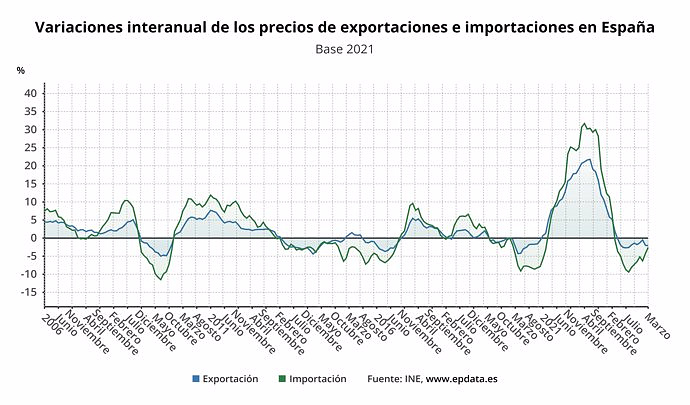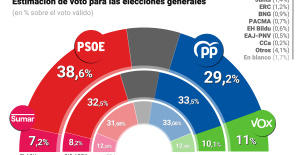MADRID, 20 Dic. (EUROPA PRESS) -
The Government has introduced in the Royal Decree-Law that reforms the unemployment benefit the application priority of the regional agreements over the state and sectoral ones that Pedro Sánchez promised the PNV in the investiture agreement with this formation.
This matter was not reported at the press conference after the Council of Ministers that approved the subsidy reform and in which the second vice president and Minister of Labor, Yolanda Díaz, appeared; the Minister of the Presidency, Félix Bolaños; the Government spokesperson and Minister of Education, Pilar Alegría, and the Minister of Health, Mónica García.
It was Aitor Esteban, spokesperson for the PNV in Congress, who revealed yesterday that this matter had been approved in the Council of Ministers. And, indeed, the Official State Gazette (BOE) of this Wednesday includes within the rule that reforms the unemployment benefit the prevalence of regional agreements over sectoral and state ones, although "conditional" on their application being more favorable for workers than that established in state conventions or agreements.
As explained by the Government in the explanatory statement of the decree approved yesterday by the Council of Ministers, the text incorporates a modification of article 84 of the consolidated text of the Workers' Statute "in order to improve the regulation of collective bargaining in the within the autonomous communities, ensuring the application of the most favorable agreements or conventions for workers".
The Executive points out that the 1994 reform of the Workers' Statute and the articulated text of the Labor Procedure Law and the Law on Infractions and Sanctions in the Social Order introduced an important reform in terms of conventional structure with the intention of promoting the role of collective bargaining at the regional level, also favoring the progression of what at that time was called the autonomous labor relations frameworks.
"It was about allowing these lower-level agreements to affect collective agreements at the state level. The wording introduced, however, was not completely correct in the design, among other issues because, together with collective bargaining at the regional level, it promoted and granted powers to sign agreements or agreements with said effects also in any area above the company and below the state level," the Government argues.
This wording was subject to subsequent modification by the Royal Decree-Law of 2011 on urgent measures for the reform of collective bargaining, in which, although the possibility of affecting state collective agreements is limited to the autonomous negotiating sphere, "it introduces important conditions by leaving this possibility to the discretion of the agreements or agreements at the state level," says the Executive.
With the modification introduced within the framework of the unemployment benefit reform, the Government "proceeds to clarify" the current regulation so that, maintaining the requirements that regional agreements and agreements be signed by legally legitimized subjects and the eventual limitation to regulate some matters, "these agreements and agreements signed at the regional level will have application priority over any other sectoral agreement or agreement at the state level, provided that said agreements and agreements obtain the support of the majorities required to constitute the negotiating commission in the corresponding bargaining unit."
However, adds the Government, "said application priority is now conditioned exclusively on the regulation of the autonomous agreements or agreements being more favorable for workers than that established in the state agreements or agreements, so that at the same time the development is promoted. of the autonomous areas of negotiation and the rights of workers".
The prevalence of regional agreements over sectoral agreements was a measure that was excluded from the 2021 labor reform, but was included in the agreement that the nationalists reached with the PSOE for the investiture of Pedro Sánchez.
As Aitor Esteban highlighted yesterday, the approval of this measure has been "long demanded" by the working class and the unions in Euskadi. "It expands what we usually call our own framework of relations," stressed the Basque spokesperson.
Specifically, the PSOE and the PNV agreed to reform article 84 of the Workers' Statute for the priority of autonomous agreements to invest in Pedro Sánchez, something that was not included in the 2021 labor reform and that caused rejection by the nationalists. in the vote.
This measure does not please the unions. Both UGT and CCOO pointed out that the structure of collective bargaining has to be addressed within the framework of social dialogue and it is a modification that was not taken into account within the scope of the labor reform.
The idea of the Basques, according to a bill that they have also registered in this legislature, was that legitimate unions and business associations of an autonomous community can negotiate collective agreements and regional interprofessional agreements "that will have application priority over any other sectoral agreement or agreement at the state level".
The PNV wanted this to happen as long as the community agreements obtained the support of the majorities required to constitute the negotiating commission in the corresponding bargaining unit and its regulation was more favorable for workers than that established in the state agreements.

 Exploring Cardano: Inner Workings and Advantages of this Cryptocurrency
Exploring Cardano: Inner Workings and Advantages of this Cryptocurrency Seville.- Economy.- Innova.- STSA inaugurates its new painting and sealing hangar in San Pablo, for 18 million
Seville.- Economy.- Innova.- STSA inaugurates its new painting and sealing hangar in San Pablo, for 18 million Innova.- More than 300 volunteers join the Andalucía Compromiso Digital network in one month to facilitate access to ICT
Innova.- More than 300 volunteers join the Andalucía Compromiso Digital network in one month to facilitate access to ICT Innova.-AMP.- Ayesa acquires 51% of Sadiel, which will create new technological engineering products and expand markets
Innova.-AMP.- Ayesa acquires 51% of Sadiel, which will create new technological engineering products and expand markets Sentences of up to 7 years for four police officers for illegal detention and injuries to a young man in Barcelona
Sentences of up to 7 years for four police officers for illegal detention and injuries to a young man in Barcelona They investigate in Jaén the death of a six-year-old boy whose mother shows signs of self-harm
They investigate in Jaén the death of a six-year-old boy whose mother shows signs of self-harm The judge orders Rubiales to appear in court once a month and ask for permission if he travels abroad
The judge orders Rubiales to appear in court once a month and ask for permission if he travels abroad Scotland's First Minister resigns after the breakdown of the Government coalition
Scotland's First Minister resigns after the breakdown of the Government coalition How Blockchain in being used to shape the future
How Blockchain in being used to shape the future Not just BTC and ETH: Here Are Some More Interesting Coins Worth Focusing on
Not just BTC and ETH: Here Are Some More Interesting Coins Worth Focusing on They create a bank of machinery sounds to prevent breakdowns through artificial intelligence
They create a bank of machinery sounds to prevent breakdowns through artificial intelligence UPV students build a prototype of a wooden house to move to Equatorial Guinea
UPV students build a prototype of a wooden house to move to Equatorial Guinea The UA opens the call for the Impulso 2024 Awards for the best innovative business initiatives
The UA opens the call for the Impulso 2024 Awards for the best innovative business initiatives ALI, virtual assistant from Alicante, internationally recognized by the OECD
ALI, virtual assistant from Alicante, internationally recognized by the OECD A million people demonstrate in France against Macron's pension reform
A million people demonstrate in France against Macron's pension reform Russia launches several missiles against "critical infrastructure" in the city of Zaporizhia
Russia launches several missiles against "critical infrastructure" in the city of Zaporizhia A "procession" remembers the dead of the Calabria shipwreck as bodies continue to wash up on the shore
A "procession" remembers the dead of the Calabria shipwreck as bodies continue to wash up on the shore Prison sentences handed down for three prominent Hong Kong pro-democracy activists
Prison sentences handed down for three prominent Hong Kong pro-democracy activists ETH continues to leave trading platforms, Ethereum balance on exchanges lowest in 3 years
ETH continues to leave trading platforms, Ethereum balance on exchanges lowest in 3 years Investors invest $450 million in Consensys, Ethereum incubator now valued at $7 billion
Investors invest $450 million in Consensys, Ethereum incubator now valued at $7 billion Alchemy Integrates Ethereum L2 Product Starknet to Enhance Web3 Scalability at a Price 100x Lower Than L1 Fees
Alchemy Integrates Ethereum L2 Product Starknet to Enhance Web3 Scalability at a Price 100x Lower Than L1 Fees Mining Report: Bitcoin's Electricity Consumption Declines by 25% in Q1 2022
Mining Report: Bitcoin's Electricity Consumption Declines by 25% in Q1 2022 Oil-to-Bitcoin Mining Firm Crusoe Energy Systems Raised $505 Million
Oil-to-Bitcoin Mining Firm Crusoe Energy Systems Raised $505 Million Microbt reveals the latest Bitcoin mining rigs -- Machines produce up to 126 TH/s with custom 5nm chip design
Microbt reveals the latest Bitcoin mining rigs -- Machines produce up to 126 TH/s with custom 5nm chip design Bitcoin's Mining Difficulty Hits a Lifetime High, With More Than 90% of BTC Supply Issued
Bitcoin's Mining Difficulty Hits a Lifetime High, With More Than 90% of BTC Supply Issued The Biggest Movers are Near, EOS, and RUNE during Friday's Selloff
The Biggest Movers are Near, EOS, and RUNE during Friday's Selloff Global Markets Spooked by a Hawkish Fed and Covid, Stocks and Crypto Gain After Musk Buys Twitter
Global Markets Spooked by a Hawkish Fed and Covid, Stocks and Crypto Gain After Musk Buys Twitter Bitso to offset carbon emissions from the Trading Platform's ERC20, ETH, and BTC Transactions
Bitso to offset carbon emissions from the Trading Platform's ERC20, ETH, and BTC Transactions Draftkings Announces 2022 College Hoops NFT Selection for March Madness
Draftkings Announces 2022 College Hoops NFT Selection for March Madness























